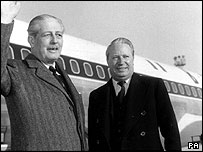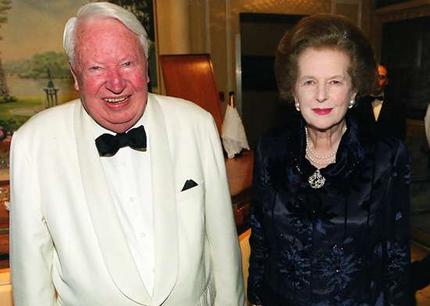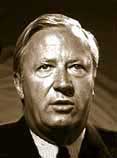![]()
![]()
Heath
![]()
Old Hickory
Sir Edward Heath died on Sunday, 17 July 2005, some days after his birthday celebrating the age of 89. He died at home with some of his friends in attendance. All parliamentary business was suspended on Monday, 18 July 2005 as a mark of respect for him and some of the members of the House of Commons competed to pay tributes, most of them very friendly. He was the first of those who are today the walking oxymorons ruining the Conservative party with the fetish of the need to change viz. a sincere moderniser. Many thought him more of a Whig than a Tory and that idea seems to have something in it. But he was certainly no liberal. He hated the market and loved the state.
Oddly, the Tories allowed him to fight four elections, despite him losing three of them. They never let his successor fight a fourth election, though, she won three in a row. Heath thought himself thereby hard treated and he rejoiced when Thatcher was ousted from power. The man was confused all his life as to what justice consisted of. He never was good at seeing things as they were. But then none of the modernising epigones are either, including Michael Portillo, the latest daft “moderniser” – or is that now to be Alan Duncan?
A Tory Moderniser
Heath worshipped power all his life, and his main quest was to create a superstate in Europe that could influence the world. He was brought up to be British and, for some reason, he even thought of himself as a conservative. But he swept that all away in his quest to have power and influence in the world. Why people feel he covered up the aim for the superstate in the 1975 referendum has never been clear to me, but many do say that he only pretended that the project was a common market that year. He seemed to be clear enough about the superstate at the time to me. I wrote him a letter in 1975 saying that he was a warmonger, who realised that Europe had the potential to be top state, even ahead of the USSR and the USA, as it had a bigger population and only needed some organisation to become number one. He wrote back saying that he was glad that I agreed with him! This could have been my bad handwriting, or it might have been that he just thought that anyone who saw the chance of belonging to the potential top dog state could hardly object to it.
Lady Thatcher, as she now is, made her peace with Heath a few years back after a long campaign against her by him. She commented on his death thus: “Ted Heath was a political giant. He was also, in every sense, the first modern Conservative leader -- by his humble background, his grammar school education and by the fact of his democratic election. As Prime Minister, he was confronted by the enormous problems of post-war Britain. If those problems eventually defeated him, he had shown in the 1970 manifesto how they, in turn, would eventually be defeated. For that, and much else besides, we are all in his debt.”
Tony Blair and Michael Howard also paid tribute to Heath. Blair said: “He was a man of great integrity and beliefs he held strongly from which he never wavered. He will be remembered by all who knew him as a political leader of great stature and significance.” That tends to forget the great U-turn, that Mrs Thatcher learnt from his folly not to repeat.
Howard described Heath as: “one of the political giants of the second half of the twentieth century. He was the last Conservative leader who had served in the Second World War. As chief whip, as a senior cabinet minister and, of course, as prime minister he made an enormous contribution to the political life of our country. He will always be remembered as a prime minister who took Britain into the European Economic Community but his achievements went far beyond that. His passing will be mourned far and wide.” Others will not regret the passing of Heath. Heath did phone up the Central Office of the Conservative party to say “rejoice, rejoice , rejoice!” when Mrs Thatcher fell from power, and maybe some rang up to say the same about the passing of Heath on Sunday. But, as Heath is said to have lost interest in politics in his final years, many others may well have got rather tired of waiting for him to die. They too, might well have lost interest in ringing up by then.
Heath is a useful example of social mobility. Few from the masses rise to the top but, by contrast, quite a few at the top have come from the bottom; and though this has long been the case, but there is no shortage of sociologists that overlook that fact. Edward Richard George Heath was a carpenter's son from Broadstairs in Kent. His mother was also of the same humble beginnings. She had been a lady's maid before her marriage. It just shows that the class society is the open society, but the sociologists all too often tend to conflate class with caste, in thought if not in word. Their case depends on caste and makes nonsense if we think of merely class. The difference they overlook, or forget, is that class is fluid and caste is needed to make the unrealistic points they want to make about British society today.
After winning a scholarship at the age of ten, Heath went to a grammar school at Chatham House, Ramsgate, from where he won an organ scholarship to Balliol College, Oxford. He had been playing the piano in formal lessons from the age of eight and he soon became accomplished on the organ to win this scholarship. He also joined the school debating society and showed an interest in politics whilst very young. Despite being in the school orchestra, politics took the helm with him early on. It has been said that this made him a bit of an outsider at school.
In October 1935, Heath went to the University of Oxford to be a commoner of Balliol College. Heath read philosophy, politics and economics, and he eventually got a second-class degree. He was disappointed not to get a first, but he had pursued such an active social life, in music societies as well as political ones, that he eventually felt he had not really lost out. In addition to the organ scholarship, his parents supported him and he got £90 a year from the Kent Education Committee. Balliol was then alone among the men's colleges of Oxford in having competitive entry for commoners. He was elected president of the junior common room for 1938-39. He took part in music as well as politics at Oxford but the latter was his chief interest. He was opposed to the Chamberlain government as he took a dim view of Hitler's Germany, where he visited to see for himself, and he also spent time in Spain and was against fascism there also. On Monday 18 July 2005, Michael Howard told the House of Commons: “In the famous 1938 Oxford by-election he [Heath] opposed the Conservative candidate, Quintin Hogg, and campaigned instead for A. D. Lindsay, the Master of Balliol, who stood on an anti-appeasement platform”. He did this, though he thought of himself, long since, as a Conservative.

Harold Macmillan and Ted Heath fly off into the future
He was elected to Parliament for the Conservative party in the 1950 election, at the age of 34. He was sent by Macmillan to attempt to get into the slowly growing European superstate in the 1950s and it remained his chief cause from then on. For some reason, Heath was chosen as the Conservative leader in the first democratic election (1965) that the Tories organised. Alec Douglas Home, the leader they were replacing, hardly seemed to be a smart Alec and indeed he confessed to going the way the wind blows in the title of his autobiography. Most must have thought that an election instead of the traditional ‘emerging leader' method that the Conservative party had hitherto used would be better. Weak as Home seemed, he does look to be a bit better than Butler, whom Macmillan (himself a bit weak) kept out by pushing for Home. But the 1965 election turned up Heath! He looked weaker than any of them. Far weaker than Enoch Powell or Reginald Maudling, whom he beat in the election for leadership. Powell came last, but it ought to have been Heath that came last, for he was inferior to the other two. The Tories have been hopeless at getting leaders ever since, and it was only by luck that they got Mrs Thatcher and William Hague, their only two adequate leaders since. Geoffrey Howe tells of how hard the decision was for him. He supported Powell on principle but on meeting Michael Alison, who had worked with Powell, he was surprised to hear that he favoured Heath, as he supposed that Heath had better judgement. Howe put the case for Powell, but was impressed by what Alison said and changed his mind to vote for Heath Howe discovered, later, that Alison was so impressed by what he had said that he had voted for Powell [ Conflict of Loyalty (1994) p39].
It was no surprise that Heath lost the 1966 election. But what a turn up for the books when he won in June 1970! He soon set about making mistakes. Before long, he put the UK on a three day week, and power cuts, the result of his inept confrontations with the unions, were a norm of his rule. Unemployment was soon over the million mark for the first time since the 1930s, and this number has not dropped significantly below a million ever since. Heath's love of Keynesianism resulted in stagflation, showing the trade off between inflation and mass unemployment to be a myth. The Phillips curve was refuted. Heath's old teacher at Oxford, John Hicks, wrote a book The Crisis of Keynesianism (1975) as a result. Heath finally put the question to the public in 1974 as to just who was to rule; himself or the miners? As the British constitution stipulated that it was Wilson rather than the miners who was the alternative to Heath, it was Wilson who was returned at the election. But Heath would not accept this answer. He attempted to form a Liberal/Tory coalition. After a bit of Jeremy Thorpe, the then Liberal leader, coming and going from Downing Street, Heath realised that he would have to let Wilson in. The grand piano had to be moved out. He had another go in the second election of 1974, but the answer was an even more convincing No.
Heath was very discontented at being removed as party leader in 1975, after those two 1974 defeats. He was an opposition member to the Conservative party for the rest of his life, boring from within and thinking – or at least saying – that by his U-turn he had reached political perfection. He thought it exceedingly silly of Mrs Thatcher to go back to the market rather than try the three day week that he seemed to think was so clearly better. In this quest to put Mrs Thatcher right, he went on and on and on and on.

Old enemies reconciled? Heath and Thatcher in later years
In the 1975 common market referendum, he took second place to Roy Jenkins. He was yesterday's man, but he continued with the quest of criticising the new Conservative leader. There really was not much else he could do in politics. He hated the House of Lords, far too traditional for him, and it often seemed that he had vague hopes of a comeback as leader. It has not been usual, until very recently, for ex-leaders to resign from the cabinet and Heath wanted to go on implementing his plans for the warmongering superstate at the Foreign Office. He was under the firm impression that he would become Foreign Secretary but, as Stephen Berry said on the LA discussion list: “He hated Thatcher and she disliked him. In 1979 when she took power, she offered Heath the job of ambassador to the U.S. A double insult. He expected a job in government and he was very anti-American”. He served 50 years in the Commons but most of them were on the backbenches. Heath fought the 1997 election but on October 24, 2000, the day after he conducted the election for the new Speaker, he announced that he would be retiring from the Commons at the end of that Parliament. He would certainly not go into the House of Lords. That was a bit too traditional or conservative for him. He consequently retired at the June 2001 general election.
Heath did have the merit to see that the Gulf War of the early 1990s was not about oil, as many people felt at the time. He correctly saw that if there was a war, some oil would be destroyed and that would make oil that bit more expensive, though Bush senior got the Saudis to largely pay for it. That ploy tended to obfuscate the objective waste the war caused for those that did not want to think much about it. In that first war with Iraq, Heath played the part later played by George Galloway in the second war by attempting to make peace rather than have a war. He asked Saddam Hussein to release the British hostages as a gesture of good will. But this quest to smooth things over peacefully failed.
Heath never married. He would not have been too good at seeing his wife's point of view. He was eminent in music and sailing as well as in politics. He once conducted a top orchestra at the Albert Hall with reasonable success, and he competed at an international level at sailing by being the captain of Britain's winning Admiral's Cup team in 1971.
Summing Heath's life up, the sometime Labour MP Tony Benn, who became good friends with Heath, having in common with him an infinite capacity for sheer error, said, with his usual unwitting irony: “He was a far greater figure than Mrs Thatcher. She did enormous damage and his analysis of what she did was correct. He was to the left of Tony Blair”. If we take “left” as free trade and “right” as protectionism, as they were on the wings of the eighteenth century French Assembly, then that is exactly wrong. But most have got the left/right split exactly wrong since the rise of the Fabians in the 1880s had the old Tory ideas as “socialist” and claimed them as “left”. If we take Benn as an anti-authority then he sums Heath up fairly well.
![]()
Further reading:
![]()
I wrote him a letter in 1975 saying that he was a warmonger, who realised that Europe had the potential to be top state, even ahead of the USSR and the USA, as it had a bigger population and only needed some organisation to become number one. He wrote back saying that he was glad that I agreed with him! This could have been my bad handwriting, or it might have been that he just thought that anyone who saw the chance of belonging to the potential top dog state could hardly object to it.
![]()
Further reading:
